Philip Zec
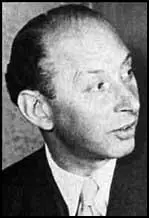
Philip Zec, the fourth of the eleven children (nine daughters and two sons) of Simon Zec, a Russian tailor,was born on 25th December 1909. He attended St Martin's School of Art, where, according to his brother, Donald Zec, "his gifts, notably in portraiture, were rapidly developed. But his vigorous draughtsmanship and flair for illustration pointed more towards commercial art, and at nineteen he set up his own studio." (1)
Zec found work with Arks Publicity. He then moved to the leading advertising agency, J. Walter Thompson and gradually established himself as one of the leading illustrators in Britain. He joined forces with the copywriter, William Connor, and Basil Nicolson to develop a strip cartoon to advertise Horlicks, the milky beverage which would relieve "night starvation". (2)
Zec became increasingly concerned about the rise of Adolf Hitler in Nazi Germany. As his biographer points out: "Commercial art became too constricting both for his powerful analytical style and for a political consciousness spurred by the rise of Hitlerism in Germany. As a socialist and a Jew, the notion of remaining on the sidelines drawing radio valves or coffee labels in Britain's post-Munich era became unthinkable." (3)
H. G. Bartholomew was appointed editorial director of the Daily Mirror in November, 1933. His first front cover was a man being lynched in California. He was described by colleagues as "illiterate and drunk" and "semi-literate and half-pissed". Other members of his staff considered him a genius and in the words of Edward Pickering, a sub-editor at the newspaper, Bartholomew had "an extraordinary flair for conveying his enthusiasm." (4)
Bartholomew was as interested in content as layout, having a clear notion of how the newspaper "could emulate New York's sensationalist tabloid dailies without necessarily sacrificing its integrity and sense of purpose". With the support of Cecil King, one of the directors of the newspaper, he decided to change its market strategy. "They aimed to attract fresh advertising revenue by targeting young working-class readers with disposable income, and set about transforming it into an American-style tabloid, staffed by a highly professional team of young editors, designers, and reporters." (5)
Philip Zec and the Daily Mirror
In 1934 Bartholomew and King turned the Daily Mirror into Britain's first modern tabloid newspaper. Over the next two years the Daily Mirror remained fairly conservative and advocated a negotiated agreement with Adolf Hitler. Like most other newspapers it supportedStanley Baldwin and Neville Chamberlain in its government's policy of appeasement. "Who will be caught again by lying twaddle about war to end war, and about our sacred honour and our solemn oath? The futile pacts and obsolete treaties may lie in pieces wherever Hitler or anybody else has thrown them. Better flimsy fragments of imbecile documents on the ground than millions of rotting bodies of young men... The time has ended for the making of further pacts, guarantees, agreements, understandings and whatnots in defence of an impossible system, which seeks to perpetuate the ludicrous settlement of the revengeful post-war years. Those arrangements still divide Europe into water-tight compartments of victors and vanquished, the satiated and the rebellious." (6)
Bartholomew and King brought in the J. Walter Thompson, the world's leading advertising agency to help them with its marketing. They pointed out that the newspaper should be designed for the longer commuting distances that were becoming increasingly common. Thompson's support was as important as their guidance, because it meant that the newspaper could depend on the backing of the advertisers as it took what might otherwise have been a very risky venture. (7)
It was the outbreak of the Spanish Civil War, that established another fascist dictator-state in Europe that resulted in a change of approach. Batholomew, who hated the arrogance and snobbery of the upper classes, encouraged the editorial staff to develop an anti-establishment tone. In 1937 Basil Nicolson, was hired as features editor. Nicholson recruited Philip Zec as the paper's political cartoonist and William Connor, who wrote a forthright column under the name Cassandra. (8)
Hugh Cudlipp, a young journalist with socialist views later explained, was also recruited: "Roy Suffern evolved and ran the news pages... I ran the features. The leader writer, Richard Jennings, wrote his own editorials. Cassandra (William Connor) edited his own column and Philip Zec evolved his own cartoons, collaborating with Cassandra on the captions. If there was a master-mind, or even two master-minds, behind the operation it was not readily apparent to the guerrillas who were were aiming the hand grenades and holding up to the public to ransom." (9)
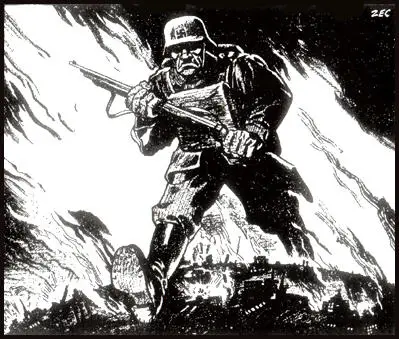
Zec's cartoons were an immediate success with the readers. Zec, who was Jewish, felt passionately about the need to defeat Adolf Hitler, a produced a series of powerful cartoons against the Nazi government. As his brother, Donald Zec, pointed out: "He presented Hitler, Goering, and others in the Nazi hierarchy as strutting buffoons. Replacing ridicule with venom, he often drew them in the form of snakes, vultures, toads, or monkeys. Not surprisingly, captured German documents listed Zec's name among those to be arrested immediately England had fallen." (10)
Richard Jennings, deeply influenced by the ideas of William Morris, wrote the editorials. Columnists like William Connor, were constantly inviting reader response and correspondence columns expanded to accommodate those anxious to obtain advice or to express political views. Philip Zec's cartoons became an important part in the way the newspaper developed a social conscience and during the late 1930s he became the "country's foremost and most notorious political cartoonist." (11)
Second World War
The newspaper now took a strong anti-fascist stance. William Connor visited Nazi Germany in 1938 and reported: "Before this visit to Germany I always had a sneaking feeling that there was a strong undercurrent of opposition to Hitler. I am now certain that I was wrong. I know now that this man has the absolute unswerving confidence of the people. They will do anything for him. They worship him. They regard him as a god. Do not let us deceive ourselves in this country that Hitler may soon be dislodged by enemies within his own frontiers. Germans regard him as the greatest figure in their history. Better and greater than Bismarck. Infinitely superior to Frederick the Great." (12)
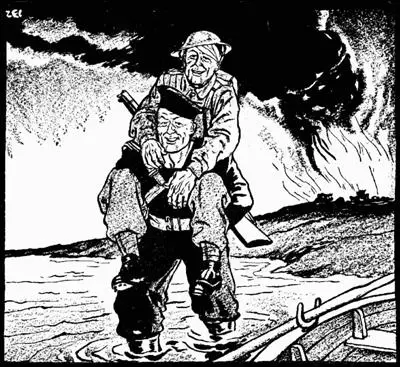
Philip Zec's developed a reputation as "the people's cartoonist" and was often willing to point out government incompetence. At a War Cabinet meeting on 7th October, 1940, Winston Churchill, raised the issue of articles and cartoons being published in the Daily Mirror and the Sunday Pictorial. Churchill claimed: "The immediate purpose of these articles seemed to be to affect the discipline of the Army, to attempt to shake the stability of the government, and to make trouble between the government and organised labour. In his considered judgment there was far more behind these articles than disgruntlement or frayed nerves. They stood for something most dangerous and sinister, namely, an attempt to bring about a situation in which the country would be ready for a surrender peace." (13)
Churchill asked who owned these newspapers. Sir John Anderson replied: "The Daily Mirror and the Sunday Pictorial were owned by a combine. A large number of shares were held by bank nominees, and it had been possible to establish which individual, if any, exercised the controlling financial interest of the newspaper. It was believed, however, that Mr I. Sieff (Israel Sieff, English businessman and Zionist and later chairman of the British retailer Marks & Spencer) had a large interest in the paper, and that Mr Cecil Harmsworth King (Cecil King, director of both newspapers) was influential in the conduct of the paper." Anderson went on to argue that "it would be wrong to attempt to stop publication of these articles by a criminal prosecution in the Courts." (14)
As Wilfrid Roberts, the Liberal Party MP pointed out: "The Daily Mirror belonged originally to Lord Rothermere. About ten years ago, Lord Rothermere sold his shares, gradually, on the Stock Exchange. They were brought up in small blocks. There is no big, or controlling, group of shares now held by one person. The shares held by nominees represent only between five and ten per cent of the whole shareholding of the paper. In other words, this paper, unlike many others, is run by a board of directors and a chairman. The Daily Mirror has not changed (its policy) in the last five or six years. Its staff has not changed, since the time when the Prime Minister wrote for it." (15)
Clement Attlee offered to speak to H. G. Bartholomew and Cecil King, two of the senior figures at the newspaper group. They met on 12th October, 1940, in an air raid shelter used by government ministers. King recorded in his diary that Attlee told them that the government believed that the newspapers showed a subversive influence which might endanger the nation's war effort. "I asked him to give an example. He said he couldn't think of one... Attlee was critical but so vague and evasive as to be quite meaningless. We got the impression that the fuss was really Churchill's, that Attlee had been turned on to do something he was not really interested in, and had not bothered to read his brief." (16)
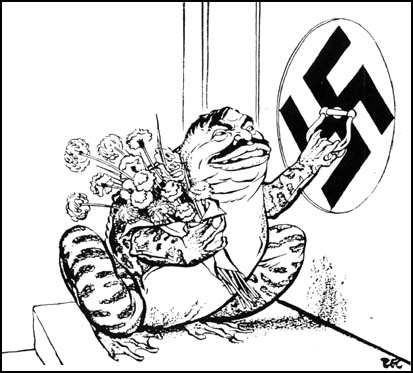
Employing fast-moving tanks backed up with air support, Germany defeated Poland in four weeks. This victory was followed by the occupation of Norway (four weeks), Netherlands (five days), Belgium (three weeks) and France (six weeks). The situation became even worse when Italy declared war on Britain on 11th June, 1940. General Henri-Philippe Pétain formed a government and at once asked the Germans for an armistice, which was concluded on 22nd June, 1940. Northern France and all her coastline down to the Pyrenees fell under German occupation. Pétain then agreed to head the Vichy government in occupied France, (17) Zec published a cartoon in the Daily Mirror on 11th October, 1940, attacking the duplicity of the French government under Pétain's pro-Nazi Vichy regime. (18)
Winston Churchill and Philip Zec
On 5th March, 1942, the Daily Mirror published a cartoon on the government's decision to increase the price of petrol. The cartoon showed a torpedoed sailor with an oil-smeared face lying on a raft. The journalist, William Connor, provided the caption: "The price of petrol has been increased by one penny. Official." As Angus Calder pointed out: "While many readers seem to have accepted this at its face value as an injunction that they should not complain about shortages and rising prices at such a time as this, Morrison took it to mean that seamen were risking their lives for profiteers at home. Ernest Bevin agreed with him, and Churchill wanted instant suppression of the paper." (19)
Zec later pointed out that the cartoon was part of a series about the black market and the dangers of wasting food or petrol. (20) The first cartoon had shown a black marketer placing flowers on the tomb of a dead soldier saying: "Poor fellow, now what can I sell his mother?" The second had emphasized the importance of not wasting food. The third in the series, was to make people aware that every drop of petrol was precious. Zec was trying to say that lives were being lost bringing tankers to Britain and that wastage was thus immoral." (21)
Philip Zec, The Daily Mirror (5th March, 1942)
The same issue carried an editorial which mocked the army's leaders as "brass buttoned, boneheads, socially prejudiced, arrogant and fussy with a tendency to heart disease, apoplexy, diabetes and high blood-pressure." (22) Winston Churchill believed that the cartoon suggested that the sailor's life had been put at stake to enhance the profits of the petrol companies. "It was, he declared, bound to have a strong effect in deterring seamen from agreeing to serve on oil tankers. The leading article he regarded as a gross and improper libel on the higher officers in the army, and incidentally on the government which appointed them, and one calculated to spread alarm and despair in the ranks and make men unwilling to fight in the belief that they were being led to their deaths by aged and stupid incompetents." (23)
In the House of Commons, Herbert Morrison, the Home Secretary, called it a "wicked cartoon" and Ernest Bevin, the Minister of Labour, argued that Zec's work was lowering the morale of the armed forces and the general public. By 18th March, 1942, the Law Officers advised Morrison that the cartoon and articles published by the newspaper were infringements of regulation 2D. However, Morrison decided against this after one of his advisers claimed that the newspaper's "criticisms simply reflected real and widespread disenchantment with the government and that it would be very imprudent to hit out at the mouth-piece for genuine popular feeling." (24)
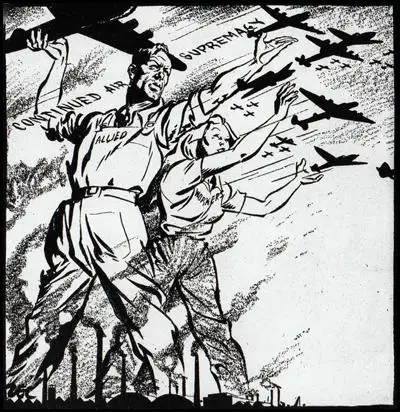
Churchill arranged for MI5 to investigate Zec's background, and although they reported back that he held left-wing opinions, there was no evidence of him being involved in subversive activities. H. G. Bartholomew and Cecil Thomas were ordered to appear before Morrison at the Home Office. Zec's cartoon was described as "worthy of Goebbels at his best" and turning on Thomas, Morrison told him that "only a very unpatriotic editor could pass it for publication". Morrison informed Bartholomew that "only a fool or someone with a diseased mind could be responsible" for allowing the Daily Mirror to publish such material. (25)
In his autobiography, Hugh Cudlipp thought that the government treated Zec very badly: "Unpatriotic? Frayed nerves had led to distorted judgement. Philip Zec was a socialist, and therefore passionately anti-Nazi. He was also a Jew, and passionately anti-Hitler. Helping the enemy? When the German High Command papers, or such as were available, were examined by the Allies after the war, a document was disclosed which reduced to fatuity the view of the British War Cabinet about the Mirror and Pictorial at the end of 1940, the beginning of 1941, and the spring of 1942. The document was an order that all Mirror directors were to be immediately arrested when London was occupied." (26)
When Anueurin Bevan heard that the government was considering closing down the Daily Mirror he forced a debate on the issue in the House of Commons. Some MPs were appalled when Herbert Morrison suggested that the newspaper might be part of a fascist plot to undermine the British Government. Several pointed out that the Daily Mirror had been campaigning against fascism in Europe since the early 1930s. In doing so, it had supported Churchill and Morrison in their struggle against appeasement, the foreign policy of Neville Chamberlain's government. (27)
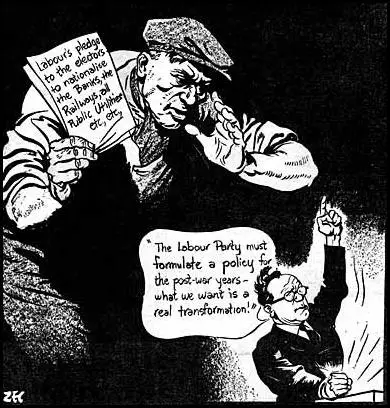
Anueurin Bevan argued in the debate that: "I do not like the Daily Mirror and I have never liked it. I do not see it very often. I do not like that form of journalism. I do not like the strip-tease artists. If the Daily Mirror depended upon my purchasing it, it would never be sold. But the Daily Mirror has not been warned because people do not like that kind of journalism. It is not because the Home Secretary is aesthetically repelled by it that he warns it... He (Morrison) is the wrong man to be Home Secretary. He has for many years the witch-finder of the Labour Party. He has been the smeller-out of evil spirits in the Labour Party for years. He built up his reputation by selecting people in the Labour Party for expulsion and suppression. He is not a man to be entrusted with these powers because, however suave his utterance, his spirit is really intolerant. I say with all seriousness and earnestness that I am deeply ashamed that a member of the Labour Party should be an instrument of this sort of thing. How can we call on the people of this country and speak about liberty if the Government are doing all they can to undermine it? The Government are seeking to suppress their critics. The only way for the Government to meet their critics is to redress the wrongs from which the people are suffering and to put their policy right." (28)
The majority of MPs were firmly behind Morrison and therefore no vote was taken over the issue. The press, understandably, was least happy with him. The Times, Manchester Guardian, News Chronicle and the Daily Herald objected to the way he had threatened to use defence regulation 2D against government critics. The National Council for Civil Liberties also expressed grave concern and organized a mass protest meeting in London in April. It has been argued that "it was not a happy experience for Morrison, to be pilloried as an enemy of civil liberties when he had fought so long behind the scenes to protect the freedom of the press." (29)
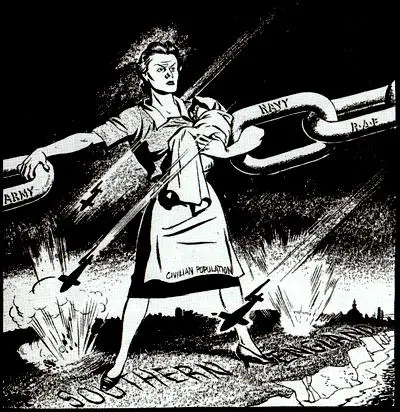
Bill Hagerty has argued that during the Second World War Philip Zec became the most important figure in the newspaper: "His cartoons continued to dominate the slim issues of a Mirror that had become the People's Paper and, most importantly, the paper of the serving soldier, sailor and airman... A socialist and a Jew... he had been attracted to newspapers as a means of expressing his strong political and social beliefs." (30)
1945 General Election
On 7th May 1945, General Alfred Jodl and Admiral Hans-Georg von Friedeburg (chiefs of the German Army and Navy, respectively) signed the unconditional surrender of the German forces at the headquarters of General Dwight D. Eisenhower at Rheims. It was agreed that hostilities would cease officially the following day. On 8th May, the British and Americans celebrated Victory in Europe Day. Philp Zec marked the occasion with a message to future British politicians: "Here you are! Don't lose it again!". (31)
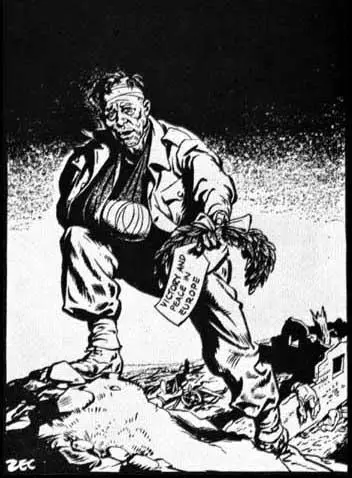
Philip Zec, The Daily Mirror (8th May, 1945)
It has been argued that Zec's cartoon "ranks among the greatest he ever drew and, for old soldiers and sentimentalists, can still bring a lump to the throat almost 60 years later." Two days after it appeared, the Daily Mirror adopted a new slogan, which would appear under its masthead in every issue for the next 15 years and encapsulate the paper's relationship with its readers: "Forward with the People". (32)
Winston Churchill resigned as Prime Minister and requested the dissolution of Parliament on 23rd May, 1945. In the last General Election it had supported Stanley Baldwin and the Conservative Party. This time it was going to be very different. It campaigned very strongly for the Labour Party and unlike most newspapers, gave its full support to the implementation of the Beveridge Report that "the proposals for social security" that "marks a big step forward in the social reconstruction of the country". (33)
On the day of the 1945 General Election, the Daily Mirror reproduced Philip Zec's VE-Day cartoon of a bloodied and bandaged soldier thrusting a victory laurel wreath. Next to it was an article calling for the people to vote for the Labour Party: "We reproduce on this page Zec's famous VE-Day cartoon. We do so because it expresses more poignantly than words could do the issues which face the people of this country today... Vote on behalf of the men who won the victory for you. You failed to do so in 1918. The result is known to all. The land 'fit for heroes' did not come into existence. The dole did. Short-lived prosperity gave way to long, tragic years of poverty and unemployment. Make sure history does not repeat itself." (34)
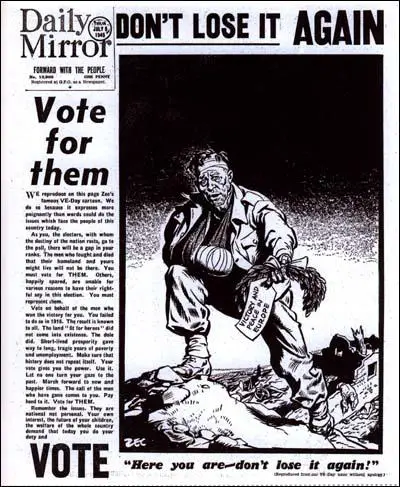
A copy of this newspaper can be obtained from Historic Newspapers.
Roy Greenslade has argued: "The slogan was cleverly aimed at the wives, girlfriends and mothers of servicemen abroad, many of whom were voting for the first time. They would, naturally, wish to do well by the men yet to return, many of whom were angry that they would have no opportunity to vote. The slogan was cleverly aimed at the wives, girlfriends and mothers of servicemen abroad, many of whom were voting for the first time. They would, naturally, wish to do well by the men yet to return, many of whom were angry that they would have no opportunity to vote. The slogan also gave political expression to the demobbed troops worried about their futures and, with great subtlety, tapped into the sense of comradeship they had experienced. The vote was for others, not just for oneself." (35)
When the poll closed the ballot boxes were sealed for three weeks to allow time for servicemen's votes (1.7 million) to be returned for the count on 26th July. It was a high turnout with 72.8% of the electorate voting. With almost 12 million votes, Labour had 47.8% of the vote to 39.8% for the Conservatives. Labour made 179 gains from the Tories, winning 393 seats to 213. The 12.0% national swing from the Conservatives to Labour, remains the largest ever achieved in a British general election. It came as a surprise that Winston Churchill, who was considered to be the most important figure in winning the war, suffered a landslide defeat. It was suggested at the time that the Mirror's "Vote For Him" campaign "may well have won more votes for the Labour party than any other journalistic enterprise". (36)
Later Years
Zec continued as the cartoonist with the Daily Mirror after the war. The circulation of the newspaper was 1,571,000 in 1939. By 1947 it had reached 3,702,000 and by 1949 it was the most popular newspaper in Britain. It supported the Labour Party in the 1950 General Election: "This is a critical moment in our history and the world's. It is not a time for starting to dither and go backwards; we must go forward determined to make secure the future of our great nation. Economic difficulties are bound to be ahead. We believe that the Labour Party is the only one that can deal with them. We support the Labour Party because it has kept its promises and earned our trust." (37)
In 1950 Philip Zec became editor of the Sunday Pictorial. In 1952 he returned to Daily Mirror but joined the Daily Herald in 1958 and retired in 1961. In the last three years of his life he was blind, but nevertheless continued to proclaim his ideals as passionately and as animatedly as ever. Zec died in Middlesex Hospital, London, on 14th July 1983. (38)
Student Activities
Primary Sources
(1) Donald Zec, Philip Zec : Oxford Dictionary of National Biography (23rd September, 2004)
His (Philip Zec) artistic talents, which may have owed something to his maternal grandfather who studied architecture in Ukraine, were revealed early. A scholarship from the local Stanhope Street elementary school took him to St Martin's School of Art, London, where his education effectively began and where his gifts, notably in portraiture, were rapidly developed. But his vigorous draughtsmanship and flair for illustration pointed more towards commercial art, and at nineteen he set up his own studio.
Working for J. Walter Thompson and other international advertising agencies, Zec became one of the leading illustrators of his day. His sculpted heads of prominent political and literary figures of the 1930s extended his range and at the same time exposed what he saw as the superficialities of the world of advertising. His work became widely recognized. One of his early posters, a vivid impression of the Flying Scotsman at speed against a night landscape, is still featured in exhibitions of steam railway memorabilia. But commercial art became too constricting both for his powerful analytical style and for a political consciousness spurred by the rise of Hitlerism in Germany. As a socialist and a Jew, the notion of remaining on the sidelines drawing radio valves or coffee labels in Britain's post-Munich era became unthinkable.
(2) When it became known that Herbert Morrison had threaten to ban the Daily Mirror over its publication of Philip Zec's cartoon on the price of petrol, some members of the House of Commons forced a debate on the issue. Morrison tried to explain his actions in the debate that took place on 26th March, 1942.
Supposing a secret Fascist organization wished to conduct propaganda for the purpose of undermining morale. If it had sense, it would not go about it by openly opposing the war. Not at all. It would set about vigorously supporting the war and then it would paint the picture that the House of Commons is rotten or corrupt or incompetent or something like that, that the Government is the same, that the chiefs of the Armed Forces are the same, in that way effecting a steady undermining of public confidence and a spread of the belief that defeat is inevitable and why should the needless spilling of blood and suffering continue. That would be a perfectly understandable Fascist technique.
(3) In March 1942 the Home Secretary, Herbert Morrison, threatened to ban the Daily Mirror after it published a cartoon by Philip Zec that criticised war profiteering. In the House of Commons , the left-wing Labour MP, Anueurin Bevan, defended Zec's cartoon.
I do not like the Daily Mirror and I have never liked it. I do not see it very often. I do not like that form of journalism. I do not like the strip-tease artists. If the Daily Mirror depended upon my purchasing it, it would never be sold. But the Daily Mirror has not been warned because people do not like that kind of journalism. It is not because the Home Secretary is aesthetically repelled by it that he warns it. I have heard a number of honourable members say that it is a hateful paper, a tabloid paper, a hysterical paper, a sensational paper, and that they do not like it. I am sure the Home Secretary does not take that view. He likes the paper. He is taking its money (waves cuttings of articles written by Morrison for the Daily Mirror).
He (Morrison) is the wrong man to be Home Secretary. He has for many years the witch-finder of the Labour Party. He has been the smeller-out of evil spirits in the Labour Party for years. He built up his reputation by selecting people in the Labour Party for expulsion and suppression. He is not a man to be entrusted with these powers because, however suave his utterance, his spirit is really intolerant. I say with all seriousness and earnestness that I am deeply ashamed that a member of the Labour Party should be an instrument of this sort of thing.
How can we call on the people of this country and speak about liberty if the Government are doing all they can to undermine it? The Government are seeking to suppress their critics. The only way for the Government to meet their critics is to redress the wrongs from which the people are suffering and to put their policy right.
(4) Wilfrid Roberts, Liberal MP for North Cumberland, was one of those who attacked government threats to close down the Daily Mirror (26th March, 1942)
The Daily Mirror belonged originally to Lord Rothermere. About ten years ago, Lord Rothermere sold his shares, gradually, on the Stock Exchange. They were brought up in small blocks. There is no big, or controlling, group of shares now held by one person. The shares held by nominees represent only between five and ten per cent of the whole shareholding of the paper. In other words, this paper, unlike many others, is run by a board of directors and a chairman. The Daily Mirror has not changed (its policy) in the last five or six years. Its staff has not changed, since the time when the Prime Minister wrote for it.
References
(1) Donald Zec, Philip Zec : Oxford Dictionary of National Biography (23rd September, 2004)
(2) John Beavan, William Connor : Oxford Dictionary of National Biography (23rd September, 2004)
(3) Donald Zec, Philip Zec : Oxford Dictionary of National Biography (23rd September, 2004)
(4) Matthew Engel, Tickle the Public: One Hundred Years of the Popular Press (1996) page 158
(5) Adrian Smith, H. G. Bartholomew: Oxford Dictionary of National Biography (23rd September, 2004)
(6) The Daily Mirror (9th March, 1936)
(7) Matthew Engel, Tickle the Public: One Hundred Years of the Popular Press (1996) page 158
(8) Mick Temple, The British Press (2008) page 38
(9) Hugh Cudlipp, Walking on the Water (1976) page 60
(10) Donald Zec, Philip Zec : Oxford Dictionary of National Biography (23rd September, 2004)
(11) Bill Hagerty, Read All About It: 100 Sensational Years of the Daily Mirror (2003) page 44
(12) William Connor, The Daily Mirror (1st April, 1938)
(13) Winston Churchill, Cabinet minutes (7th October, 1940)
(14) Sir John Anderson, Cabinet minutes (7th October, 1940)
(15) Wilfrid Roberts, House of Commons (26th March, 1942)
(16) Cecil King, diary entry (12th October, 1940)
(17) A. J. P. Taylor, English History: 1914-1945 (1965) page 594
(18) Mark Bryant, World War II in Cartoons (1989) page 57
(19) Angus Calder, The People's War (1969) page 288
(20) Martin Walker, Daily Sketches: A Cartoon History of Twentieth Century Britain (1978) page 138
(21) Mark Bryant, World War II in Cartoons (1989) page 97
(22) The Daily Mirror (5th March, 1942)
(23) Francis Williams, Press, Parliament and the People (1946) page 35
(24) Bernard Donoughue & George W. Jones, Herbert Morrison: Portrait of a Politician (1973) page 299
(25) Lance Price, Where Power Lies: Prime Ministers v the Media (2010) page 121
(26) Hugh Cudlipp, Walking on the Water (1976) page 136
(27) Matthew Engel, Tickle the Public: One Hundred Years of the Popular Press (1996) page 167
(28) Aneurin Bevan, House of Commons (26th March, 1942)
(29) Bernard Donoughue & George W. Jones, Herbert Morrison: Portrait of a Politician (1973) page 300
(30) Bill Hagerty, Read All About It: 100 Sensational Years of the Daily Mirror (2003) pages 55-56
(31) Mark Bryant, World War II in Cartoons (1989) page 141
(32) Bill Hagerty, Read All About It: 100 Sensational Years of the Daily Mirror (2003) page 59
(33) The Daily Mirror (September, 1944)
(34) The Daily Mirror (5th June, 1945)
(35) Roy Greenslade, How Newspapers Make Profits from Propaganda (2003) page 35
(36) R. B. McCallum, The British General Election in 1945 (1947) page 205
(37) The Daily Mirror (21st February, 1951)
(38) The Daily Mirror (25th October, 1951)
John Simkin

